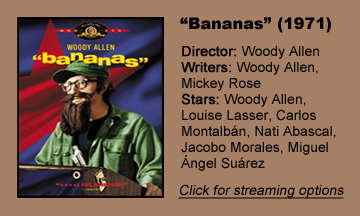“Bananas” (1971) is an early calling card of Woody Allen’s oeuvre (although he co-writes with Mickey Rose) as it’s driven by snort-worthy off-the-cuff lines about topics ranging from the personal to the sociopolitical. But it falls short of his elite comedies; for example, “Love and Death” would go on to do this brand of humor better.
Even though it has messages, I’m not left with a profound takeaway; I’m merely left with a smile on my face.
Smart but unfocused
To give an example of how “Bananas” is smart yet unfocused, one of the lines I found funniest is when a U.S. interventionist soldier asks his commander whether they are fighting for or against the government of San Marcos. “The CIA’s not taking any chances this time,” the commander replies. “Some of us are for, some of us are against.”
It’s a great line that skewers U.S. foreign policy, but I can’t honestly say “Bananas” is a biting satire overall. It’s happy to lean toward silly farce.
That’s not nothing with Allen leading the way as Fielding Mellish, a depressive American product tester who – after a series of bizarre events that I’ve already forgotten – ends up being a key figure in the San Marcos civil war.
Allen relies slightly more on pratfalls than is the norm (nervous at a state dinner, Fielding bites into and chews his wine glass), although he delivers some conversation-closing one-liners, too.
Funny introduction
Our introduction to Fielding’s life is great, as he attempts to buy a porn magazine at a crowded newsstand; every feared moment happens to him, from the prim woman eyeing him as he attempts to peek at a nudie mag to the clerk loudly inquiring about the cover price of Orgasm.
It’s followed by an OK subway-thug sequence (look for a pre-stardom Sylvester Stallone), and the long joke’s punchline finds another proper woman gleefully reading Orgasm.
After this, I don’t sense a deep investment in any of the characters; instead, Allen and Rose are invested in good, off-the-wall humor even if it has little or nothing to do with the plot.
An example: Carlos Montalbán’s ruling general of San Marcos reserves a hotel room over the phone just like a common person, quibbling about prices. “Bananas” is good at presenting the purest stereotypes, then undercutting them in the most mundane ways.
An amusing premise opens the film and sets the skit-based approach when totally in-character “ABC’s Wide World of Sports” reporters Roger Grimsby and Howard Cosell cover the assassination of the president of San Marcos like it’s a sporting event.
Certainly, this is a commentary on how international news is similar to sports for many viewers: It’s all entertainment. It also lightly lampoons “WWOS’s” claim that it covers the best sporting events from every corner of the globe.
Keaton is missed
Not having Diane Keaton across from Allen this time hurts a little. A passable Louise Lasser instead has the role of Nancy, the women’s lib student whom Fielding falls for. Instead of being self-deprecating here, Allen lets Nancy deprecate the main character.

A highlight is when she breaks up with Fielding because “something is missing.” He runs through all his potential flaws – short stature, bad teeth and immaturity on emotional, sexual and intellectual grounds — and she confirms that each one of those things is true, but not the reason for the breakup.
“Bananas” is not focused enough on crafting Fielding into a memorable neurotic or making a profound point about American interventionism. And the non sequitur sequences are dinged by the fact that Allen would later do them better.
For instance, Fielding’s dialog-free flirtation-while-eating with a female San Marcos rebel soldier is not as crisply staged as the similar opera-house sequence in “Love and Death.”
This one came first, though, and it deepened the farcical ground that future films – from Allen and other spoofers – would further mine. “Bananas” doesn’t hold up as well as some other early Allen comedies. But it’s totally painless to watch, with plenty to smile at.


